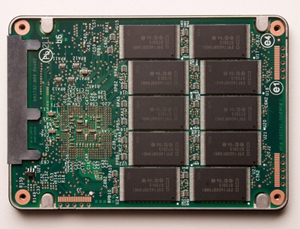Intel unveils third generation of SSDs

Intel has introduced the latest versions of its 25nm Nand flash solid-state drives, which have a greater capacity and a lower price than previous models.

Intel's 320 SSD series replaces the previous X25-M family. Photo credit: Intel
The 2.5-inch solid-state drive (SSD) 320 series, announced on Monday, follows on from the X25-M SSD line and ranges in capacity from 40GB to 600GB. That maximum storage capacity is more than triple the 160GB top end in the previous line, but costs around 30 percent less, the company said. Interface is taken care of by 3Gbps Sata, as with its predecessor.
"Intel's third generation of SSDs adds enhanced data security features, power-loss management and innovative data redundancy features," Pete Hazen, director of marketing in Intel's non-volatile memory division, said in a statement.
The drives all come with onboard 128-bit AES encryption for enhanced data security and a data safety facility that guards against unexpected system power loss. Each drive comes with an array of surplus flash memory, so if a Nand array is faulty, the controller will reconfigure the SSD to protect against data loss.
The 320 series is a mainstream version of the tiny 34nm-process 310 family that was unveiled in late December. Intel is on a push to get the drives into modern datacentres, and has set up a dedicated section on its website to tout the benefits of SSDs — chiefly speed of data access, longer lifespan and lower power consumption.
The 600GB drive is capable of up to 39,500 input/output operations per second (IOPS) random reads and 23,000 IOPS random writes. Sequential write speeds have been doubled from the X25-M to around 220MBps, and sequential read speeds reach up to 270MBps.
Competing products
The Intel SSDs stand up favourably against competing products from companies such as Samsung and Hitachi. The £425 Samsung 470 drive, released in November, ranges in size between 64GB and 256GB, and has 31,000 random read IOPS and 21,000 random write IOPS.
Also in November, Hitachi released its Ultrastar family of drives, made using a 34nm process. These scale up to 400GB in capacity, and have faster reads (46,000 IOPS) and interfaces (6Gbps Serial Attached SCSI) than the Intel 320 series.
Purchasers of the 320 drive will get the Intel SSD Toolbox with Intel SSD Optimiser, which gives Microsoft Windows users a set of management and diagnostic tools for the SSDs.
The drives are priced in batches of 1,000. The 40GB model starts at $89 (£56) per drive, 80GB at $159, 120GB at $209, 160GB at $289, 300GB at $529 and 600GB at $1,069. Retailers will have consumer pricing, Intel said.
Get the latest technology news and analysis, blogs and reviews delivered directly to your inbox with ZDNet UK's newsletters.